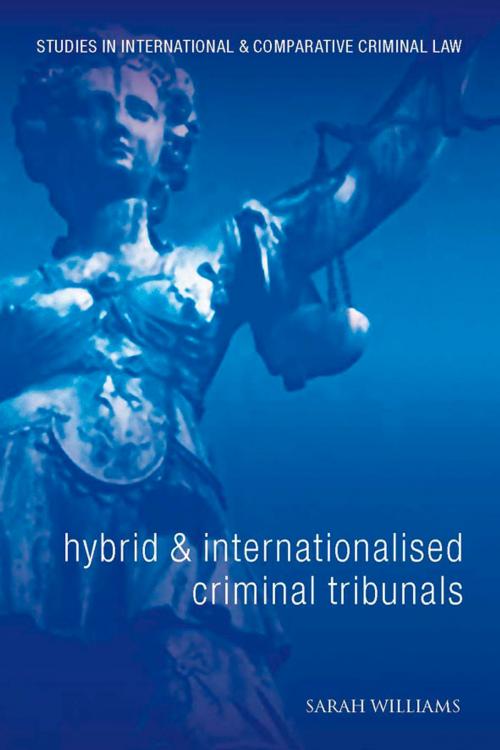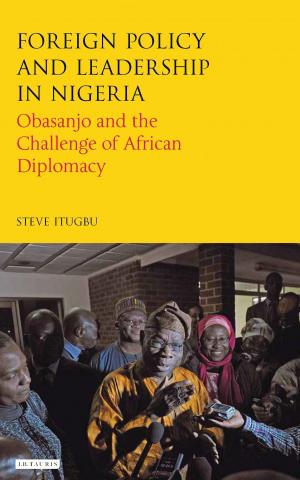Hybrid and Internationalised Criminal Tribunals
Selected Jurisdictional Issues
Nonfiction, Reference & Language, Law, International, Criminal law| Author: | Sarah Williams | ISBN: | 9781847319258 |
| Publisher: | Bloomsbury Publishing | Publication: | April 2, 2012 |
| Imprint: | Hart Publishing | Language: | English |
| Author: | Sarah Williams |
| ISBN: | 9781847319258 |
| Publisher: | Bloomsbury Publishing |
| Publication: | April 2, 2012 |
| Imprint: | Hart Publishing |
| Language: | English |
In recent years a number of criminal tribunals have been established to investigate, prosecute and try individuals accused of serious violations of international humanitarian law and international human rights law. These tribunals have been described as 'hybrid' or 'internationalised' tribunals as their structure and applicable law consist of both international and national elements. Six such tribunals are currently in operation: the Special Court for Sierra Leone, the Extraordinary Chambers in the Courts of Cambodia, the International Judges and Prosecutors Programme in Kosovo, the War Crimes Chamber for Bosnia and Herzegovina, the Iraqi High Tribunal and the Special Tribunal for Lebanon. The Special Panels for Serious Crimes in East Timor suspended operation in May 2005, although there continues to be some international involvement in investigation and prosecution of serious crimes. Suggestions have also been made that this model of tribunal would be appropriate for the prosecution of atrocities committed in, among others, Burundi, the Sudan, the Democratic Republic of Congo, Kenya and Liberia, as well as for a wider range of international crimes, most recently piracy.
The key aims of this book are: to place the model of hybrid and internationalised tribunals in the context of other mechanisms to try international crimes; to examine the increasing demand for the establishment of hybrid and internationalised judicial institutions and the factors driving such demand; to define the category of 'hybrid and internationalised tribunals' by examining the key features of the existing and proposed hybrid or internationalised tribunals, as well as the features of those institutions with international elements that are generally excluded from this category; to determine the legal and jurisdictional bases of existing hybrid and internationalised tribunals; to analyse how the legal and jurisdictional basis of a tribunal affects other issues, such as the applicable law, the application of amnesties and immunities and the relationship of the tribunal with the host state, third states, national courts and other international criminal tribunals. The book concentrates on the definitional, legal and jurisdictional aspects of hybrid and internationalised criminal tribunals as this has been the subject of some confusion in arguments before the tribunals and in the judgments of the tribunals. In its concluding section, the book examines the future role of internationalised and hybrid criminal tribunals, particularly in light of the establishment of the ICC, and the potential use of such tribunals in other contexts. It also assesses how hybrid and internationalised tribunals fit into a 'multi-layered framework' of international criminal law and transitional justice.
In recent years a number of criminal tribunals have been established to investigate, prosecute and try individuals accused of serious violations of international humanitarian law and international human rights law. These tribunals have been described as 'hybrid' or 'internationalised' tribunals as their structure and applicable law consist of both international and national elements. Six such tribunals are currently in operation: the Special Court for Sierra Leone, the Extraordinary Chambers in the Courts of Cambodia, the International Judges and Prosecutors Programme in Kosovo, the War Crimes Chamber for Bosnia and Herzegovina, the Iraqi High Tribunal and the Special Tribunal for Lebanon. The Special Panels for Serious Crimes in East Timor suspended operation in May 2005, although there continues to be some international involvement in investigation and prosecution of serious crimes. Suggestions have also been made that this model of tribunal would be appropriate for the prosecution of atrocities committed in, among others, Burundi, the Sudan, the Democratic Republic of Congo, Kenya and Liberia, as well as for a wider range of international crimes, most recently piracy.
The key aims of this book are: to place the model of hybrid and internationalised tribunals in the context of other mechanisms to try international crimes; to examine the increasing demand for the establishment of hybrid and internationalised judicial institutions and the factors driving such demand; to define the category of 'hybrid and internationalised tribunals' by examining the key features of the existing and proposed hybrid or internationalised tribunals, as well as the features of those institutions with international elements that are generally excluded from this category; to determine the legal and jurisdictional bases of existing hybrid and internationalised tribunals; to analyse how the legal and jurisdictional basis of a tribunal affects other issues, such as the applicable law, the application of amnesties and immunities and the relationship of the tribunal with the host state, third states, national courts and other international criminal tribunals. The book concentrates on the definitional, legal and jurisdictional aspects of hybrid and internationalised criminal tribunals as this has been the subject of some confusion in arguments before the tribunals and in the judgments of the tribunals. In its concluding section, the book examines the future role of internationalised and hybrid criminal tribunals, particularly in light of the establishment of the ICC, and the potential use of such tribunals in other contexts. It also assesses how hybrid and internationalised tribunals fit into a 'multi-layered framework' of international criminal law and transitional justice.















